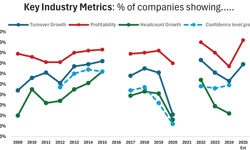"A lot of people think they have had five years' experience and actually what they have had is one year's experience, repeated five times. You don't have to change company, just make sure you volunteer and you have a go at everything - do the shitty retail, do the shitty international stuff." Stevie Spring, interviewed by MediaWeek in 2006
As someone working in the circulation team at Future Publishing at the time, the casual dismissal of the retail function by our CEO certainly made me take notice. Moving around a business is good advice. Working within different departments gives you wider perspective on the variety of skills and micro-cultures which make up an organisation.
Circulation departments use the acronym-based language of the supply-chain - RSV and SBR, BOGOFs and EPOS - which I’m sure the rest of the company found hard to decipher.
When I moved into the advertising team, the language noticeably shifted into using a scattergun of less precise ‘power words’. Every agency brief wanted ‘an engaging, game-changing, never-seen-before, media-first, innovative partnership’ so those are the words we’d gush in response.
Digital publishing is a world even more acronym-heavy and data-driven than circulation with the language of SEO and ARPU, DNS and CMS, CTR and CPMs. The jargon serves to create a protective cushion which, for those so-minded, can be useful to hide behind.
But by far the biggest culture shock was when I became immersed in the exhibition culture for the first time. At UBM, the world’s second largest events organiser, the exhibition lexicon is deeply entrenched within the company.
As a reliable translation of events language has yet to be written, I thought I’d have a stab at it. Let’s start with the most important of all:
Rebook:The revenue-engine of any exhibition business, rebook culture is a force to be reckoned with. Right from the start of an exhibition, sales teams start approaching exhibitors to rebook for the following year. As a ‘strong rebook’ can account for as much as 80% of the annual revenue for an event, it’s the sacred cow of any event and run with military precision and walkie-talkies.
Cool Off: The period immediately following a rebook when exhibitors are given time to reconsider their rash decision to rebook.
Square Meterage: The CPM of the events world; square meterage is the currency for physical floorspace and the yield by which exhibitions are measured.
On-Site: Simply being present at the event, but really it means far more than that. It’s a phrase which has particular weight of meaning in the hearts of event profs. On-site plays by different rules to the rest of the year.
The above can be put together in a convincing sentence: “We came off-site with a 68% rebook, though that dropped about 10% in cool-off with complaints mostly about hygiene factors we can sort out, but any growth has come from increasing yield.”
Density: The perceived number of visitors on the show floor at any time. More a feeling than something which can be accurately measured – an expanding number of exhibitors with static number of visitors would lead to a show feeling less ‘dense’ to exhibitors.
Build-Up: The chaotic days immediately preceding the event opening, when the event organisers and exhibitors will don safety boots and high viz jackets, and ‘build up’ a city of stands in a previously empty warehouse. It’s actually pretty amazing to see before and after.
Hygiene Factors: Queues for food and drinks, scanners which don’t work, messy bins and toilets, more queuing for seminars, slow Wi-Fi; these are all the ‘hygiene factors’ which leave a lasting impression with visitors and exhibitors. A show can deliver the most inspirational content and perfectly match buyers and sellers, but none of that matters unless the hygiene factors are taken care of. Which brings us to…
Op’s Fault: When something goes wrong, it is usually known as “Op’s Fault”, referring to the hard-working operations team who actually, you know, make the event happen.
Confex: A conference with exhibition-style stands in the lobby. It’s a mid-way point between a conference growing into a larger exhibition.
ExProm / VisProm: Contraction of ‘Exhibitor Promotion’ - meaning a sales email which goes out to potential exhibitors, and ‘Visitor Promotion’ - emails encouraging potential visitors to register to attend.
Pre-Reg: In the three months ahead of an event, a long campaign of emails begins to pester audiences into pre-registering for an event, filling out seven pages of demographic details. The number of people who have pre-registered is one of the only real indicators of the success of an event marketing campaign until the doors open, so is taken very seriously.
Quality: In B2B events, the ‘quality’ is usually defined by the job titles of relevant visitors. Seniority is generally considered to be the most ‘quality’, students should probably be removed by force.
Conversion: How many of those pre-registered to attend actually turn up.
A typical usage might be: “VisProms have started and pre-reg is down vs same time last year…” (panic) “… but quality is up…” (don’t panic just yet) “… but quality is less likely to convert” (now panic. Send more VisProms!).
Year Round: For a culture built around two / three day events repeated once a year, ‘Year Round’ is a regular topic of conversation. It means that maybe we should do something with audiences and clients beyond the two / three day event, which of course we should.
Other fun words include cabaret seating, silent discos, show makers, speed dating and geo-adapts. Start liberally peppering your conversation with some of these words and you too could pass for a native.












